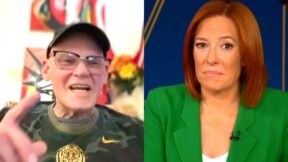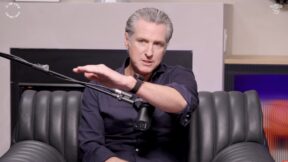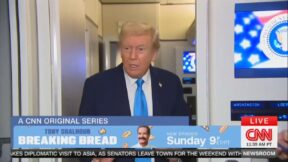Amy Coney Barrett Declines to Say Whether Trump Should Commit to a Peaceful Transfer of Power, Has the Right to Self-Pardon
During her Senate Judiciary hearing, Supreme Court nominee Judge Amy Coney Barrett declined to answer two direct, back-to-back questions from Sen. Cory Booker (D-NJ) about a president’s ability to self-pardon or refusal to commit to a peaceful transfer of power.
Booker’s questions, which came on the second day of Barrett’s Senate nomination hearing, were not-so-subtly targeting President Donald Trump, who sparked bipartisan outrage — and a unanimous Senate resolution effectively rebuking him — when he stubbornly refused to commit to a peaceful transfer of power if he were to lose the 2020 election. In addition, Trump, during the height of the Mueller probe in 2018, asserted that he had the “absolute right to pardon” himself. And a key lieutenant from Mueller’s teams warned over this past weekend that Trump is likely to try such a move if he fails in winning re-election.
“So judge, I appreciate what you’ve said about respecting our founding fathers and originalism,” Booker began. “I’m asking you, in light of our founding fathers, in light of our traditions, in light that everyone who serves in that office has sworn an oath with a quote swear to preserve and protect and defend the Constitution of the United States, I’m just asking you, should a president commit themselves like our founding fathers, I think they have a clear intention, like the grace that George Washington showed, to the peaceful transfer of power. Is that something that presidents should be able to do?”
“Well one of the beauties of America from the beginning of the republic is that we have had peaceful transfers of power. And that disappointed voters have accepted the new leaders that come into office and that is not true in every country,” Barrett said. “I think it is part of the genius of our Constitution and the good faith and goodwill of the American people that we haven’t had the situations that have arisen in so many other countries where there have been, where those issues have been present.”
After that response, which never directly addressed a president’s public commitment to that tradition, Booker turned to the question of a president abusing the office’s clemency powers for a get-out-of-jail-free card.
“Do you think the president has the power to pardon himself for any past or future crimes he may have committed against the United States of America?”
“Senator Booker, that would be a legal question, that would be a constitutional question,” Barrett quickly replied, teeing up another punt. “So, in keeping with my obligation not to give hints, previews, or forecasts of how I would resolve the case, that’s not one that I could answer.
“Well I think I agree with you,” Booker said in a rapid follow-up, trying to highlight how Trump’s egregious norm-breaking raises grave constitutional questions. “That it is an issue right now. Something I never thought would be an issue before.”
Watch the video above, via MSNBC.




